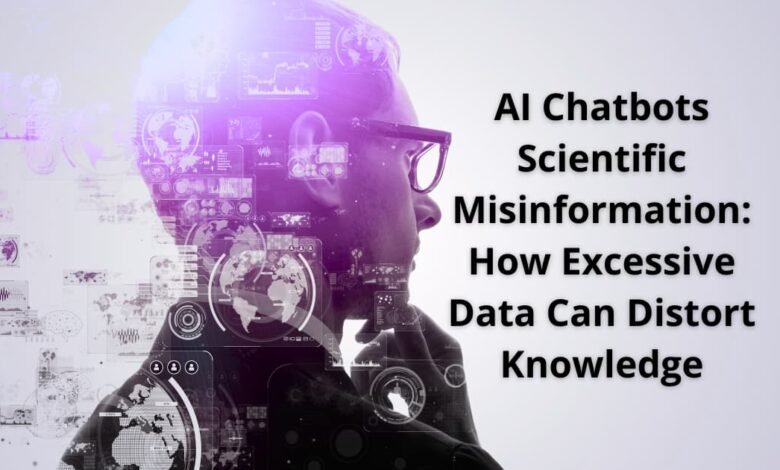AI Chatbots Scientific Misinformation: How Excessive Data Can Distort Knowledge

AI chatbots scientific misinformation can arise when large datasets introduce errors, bias, or outdated information into AI-generated responses.
The Challenge of AI Chatbots Scientific Misinformation
AI chatbots rely on massive datasets collected from academic papers, online articles, forums, and other sources. While large datasets improve the system’s ability to generate responses, they also increase the risk of AI chatbots scientific misinformation by including:
- Outdated research: Studies that have been replaced by more recent findings.
- Pseudoscientific claims: Unverified or low-quality sources.
- Biases in representation: Certain fields are overrepresented online, while niche or emerging topics are underrepresented.
Marcus and Davis (2020) highlight that AI language models “reflect the biases and inaccuracies present in their training data,” which can lead to AI chatbots scientific misinformation if not properly curated.
How AI Chatbots Scientific Misinformation Occurs
AI predicts responses based on patterns in the data it has ingested, without fully understanding content. This can result in:
- Overgeneralization: Presenting conflicting studies as consensus.
- Amplification of errors: Repeating misleading information that appears credible.
- Context loss: Omitting crucial experimental details or methodological constraints.
For instance, AI chatbots scientific misinformation can occur when outdated medical treatments are presented as effective due to inclusion in early studies without considering more recent clinical trials.
Impact on Public Understanding and Policy
The consequences of AI chatbots scientific misinformation are significant:
- Public health decisions may be affected if AI advice is taken at face value.
- Policymakers may be misled on issues like climate change or emerging technologies.
- Misconceptions can propagate widely due to repeated AI-generated content.
The World Economic Forum (2023) reports that “reliance on AI for information can amplify misinformation if training datasets are not curated for accuracy and reliability,” directly linking AI to scientific misinformation risks.
Ensuring Accuracy to Reduce AI Chatbots Scientific Misinformation
Strategies to mitigate AI chatbots scientific misinformation include:
- Curated datasets: Prioritize peer-reviewed research and authoritative sources.
- Bias detection: Regular audits to identify misinformation patterns.
- Expert oversight: Domain experts review outputs before publication.
- Transparency: Indicating source origins allows verification by users.
Proper implementation of these measures ensures AI remains a tool for scientific support rather than spreading AI chatbots scientific misinformation.
User Responsibility
Even with robust safeguards, users play a critical role in preventing AI chatbots scientific misinformation:
- Cross-reference AI responses with peer-reviewed sources.
- Approach medical, environmental, or technical advice cautiously.
- Understand that AI provides summaries, not definitive conclusions.
Excessive or poorly curated datasets can introduce AI chatbots scientific misinformation, potentially distorting scientific understanding. By combining curated data, expert oversight, and responsible user engagement, AI systems can enhance knowledge without spreading inaccuracies. Addressing AI chatbots scientific misinformation is essential for preserving scientific integrity in the age of AI.
FAQs
Q1: Can AI provide fully accurate scientific information?
No. AI can summarize data but cannot replace human expertise in evaluating research quality or context.
Q2: Which fields are most vulnerable to AI chatbots scientific misinformation?
Rapidly evolving fields like medicine, climate science, and technology are particularly at risk due to fast changes in knowledge.
Q3: How can users verify AI-generated content?
Cross-check AI outputs with peer-reviewed studies, official research institutions, and expert reviews.
Q4: Does feeding more data into AI improve accuracy?
Not always. More data may introduce outdated or low-quality sources, increasing the risk of AI chatbots scientific misinformation.
Discover more from Feenanoor
Subscribe to get the latest posts sent to your email.









